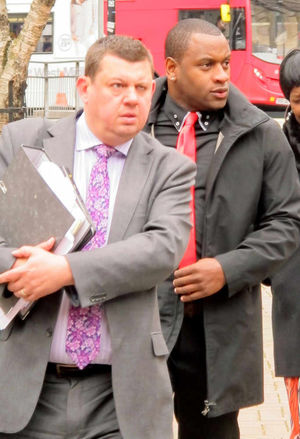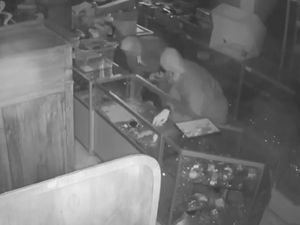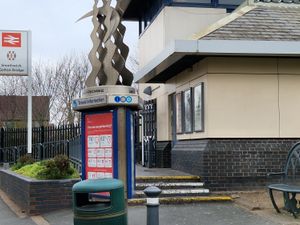Former West Bromwich Albion striker 'cast his net around' for players willing to take part in match-fixing plot
A former Premier League footballer 'cast his net around' for players willing to take part in a plot to fix lower league matches, a court has heard.

Ex-West Bromwich Albion striker Delroy Facey, 34, is alleged to have become involved in the 'ugly side' of his sport by acting as a middleman for two men who have already been convicted of match-fixing.
Facey, who also played for Bolton and Hull City, denies conspiracy to commit bribery and is standing trial at Birmingham Crown Court alongside former non-league player Moses Swaibu.
Opening the Crown's case against both Facey and Swaibu at the start of a three-week trial, prosecutor Nick Mather told jurors they would not need to know anything about football to try the defendants.

Mr Mather told the jury panel: "Football in this case is really nothing more than a means to an end - it's an opportunity to make money.
"It's described sometimes as the beautiful game but football has an ugly side to it as well, and it's that ugly side we are going to be looking at."
After explaining to jurors that match-fixers Chann Sankaran and Krishna Ganeshan were found guilty of conspiracy to commit bribery at a previous trial, Mr Mather alleged that Swaibu was one of the players they had tried to corrupt.
Sankaran and Ganeshan, both from the Far East, were at the centre of the conspiracy, the court heard, having travelled to Britain with the specific purpose of fixing matches.
The Crown alleges that the plot - which aimed to profit from rigged bets - targeted the lower leagues because of the high level of scrutiny surrounding the Premier League.
Swaibu played at a semi-professional level between 2009 and 2014, including stints with London-based Sutton FC and Brighton club Whitehawk.
Jurors were also given details of Facey's career, which included a spell at Lincoln City in which he earned around £65,000 during the 2010/11 season.
Describing Facey's alleged role in the conspiracy, Mr Mather added: "He was a middleman, a fixer. He was somebody who cast his net around to find players who might be willing to take part in match-fixing."
By the time of the alleged conspiracy in November 2013, Mr Mather told the court, Facey was earning considerably less than previously.
"That may well have been his motivation, the prosecution say, for what took place," Mr Mather said of Facey's reduced income.
Informing jurors that another footballer, former Whitehawk FC defender Michael Boateng, was also found guilty at a previous trial, Mr Mather said there was no doubt that an agreement to fix lower league matches occurred.
"This case is not about whether this scheme existed," the prosecutor told the jury. "The issue for you to decide is whether you are sure that firstly, Delroy Facey, and secondly Moses Swaibu, was a part of that agreement.
"This case is focused on them and what they did, and why they did it."
Facey, from Woodhouse Hill, Huddersfield, and 25-year-old Swaibu, of Tooley Street, Bermondsey, south London, deny conspiring together with others to commit bribery between November 1 and 27, 2013.
Mr Mather said betting on football was not confined to the Premier League and extended from the very top of the sport down to semi-professional leagues.
Lower league games in the Football Conference had been targeted, Mr Mather claimed, partly because highly-paid professionals would have to be offered "astronomical" sums to even think about becoming involved in corruption.
The conspiracy came to the attention of the National Crime Agency after initial inquiries by a private investigator who wanted to expose match-fixing led to the identification of Sankaran.
A national newspaper then became involved, the court was told, and Sankaran arrived in the UK in November 2013.
During a meeting with an undercover investigator on November 16, Sankaran is alleged to have made unsuccessful attempts to contact footballers and made reference to an agent named Delroy who used to play for Bolton.
At that point, the court heard, the National Crime Agency took over the investigation, deploying a covert officer to gather evidence.
The officer met Sankaran five days later and mobile phones belonging to the defendants, including Facey, were subsequently seized.




